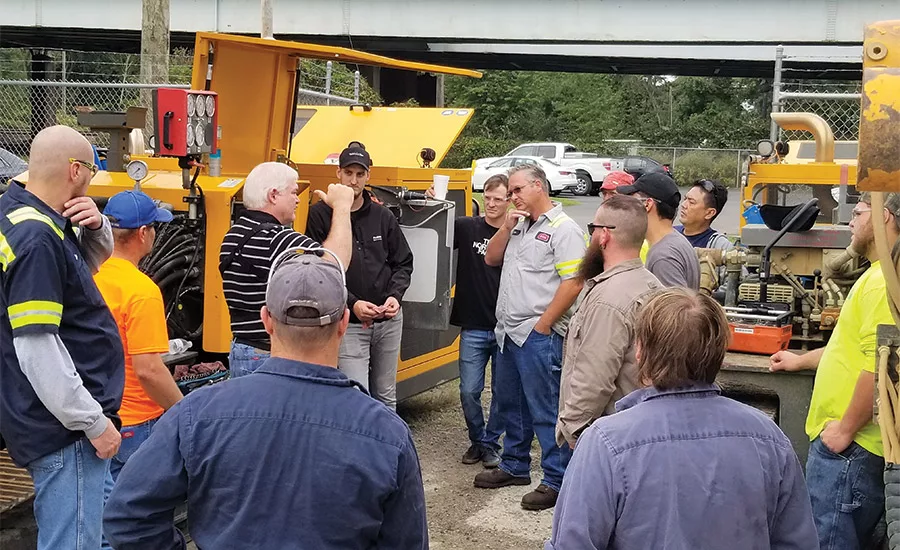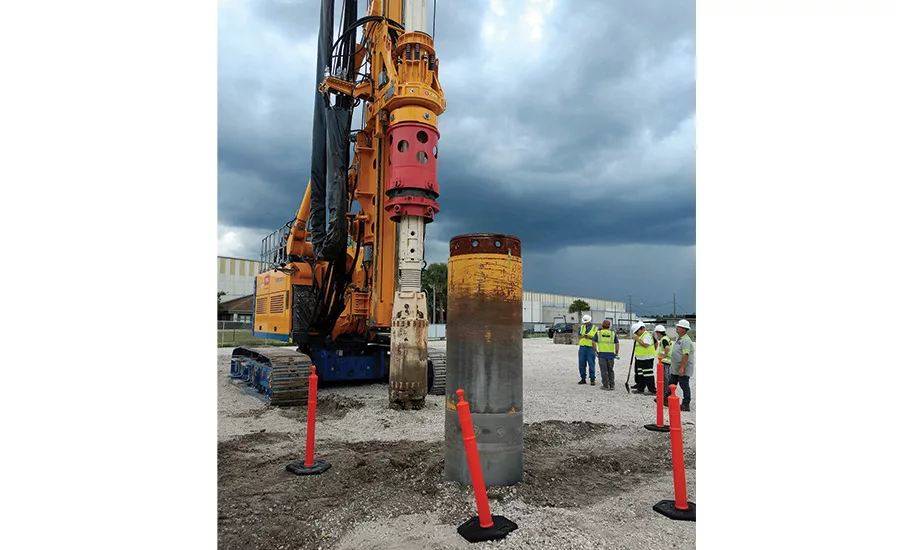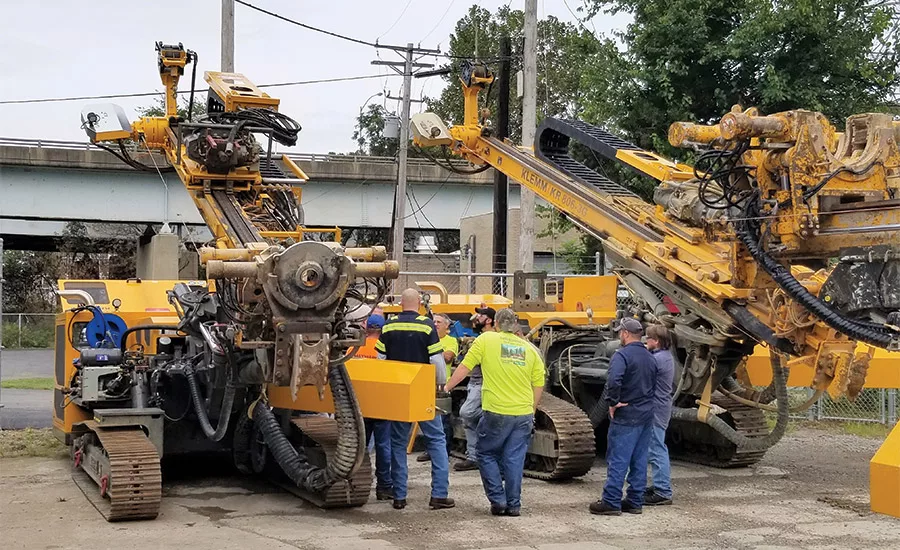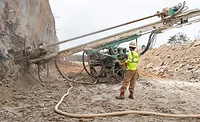Company Ramps Up Foundations, Micropile Training for Drillers

Burt Kerns conducts a recent training. Kerns, who is certified by Klemm, takes pride in ECA’s training for operators, which “ultimately makes them better, safer and more productive drillers.”
Source: ECA photos

ECA’s Technical Training program provides a basic knowledge of the principles of electrical and hydraulic systems and includes both classroom and hands-on instruction.

A lot of our customers have their own technicians,” Kerns says. The Technical Training program, he says, helps them work smarter and more efficiently.

ECA’s Operator Training program is certified and features four and a half days of classroom training focused on the safe and efficient use of Bauer BG drill rigs, RG pilling rigs, MC duty-cycle cranes and Klemm drill rigs.
Source: ECA
Equipment Corporation of America (ECA) has taken their leadership role in drill rig operator training to a new level with the establishment of the ECA Training Center in Jacksonville, Florida. The facility will offer a host of training types and exams related to its Bauer and Klemm lines of equipment. The company has even adopted the slogan, “The Cornerstone of Your Training Foundation,” to draw attention to its increased focus on training.
The vision for the center grew from a drive within the industry for formal training. In December 2018 the National Commission for the Certification of Crane Operators (NCCCO) and the International Association for Foundation Drilling (ADSC) announced the introduction of a certification program for drill rig operators. There was no formal training prior to this, so the associations formed a joint task force in February 2017 to take a proactive stance. In fact, ECA’s Bauer trainer Joe Kinworthy was an active member. The outcome was the establishment of written and practical examinations for Foundation Drill Rig (FDR) and Anchor/Micropile Drill Rig (AMP).
A Deeper Commitment to Training
ECA’s expansion into training predated NCCCO Certification, according to Dave Schell, ECA’s director of parts and service.
“The idea behind our training program kicked off a couple years ago,” he recalls. “We saw the need to elevate our technicians to the next level, and on the customer side, there wasn’t any specific training readily available in the U.S. We saw the opportunity to fill that gap.”
Bauer Maschinen named ECA a Bauer Regional Training Center in 2017. That pivotal recognition led to serious discussions about taking a more prominent role in foundation equipment training. ECA initially focused on developing technical and operator’s training for Bauer machinery.
In 2018 ECA knew it wanted to make a more serious commitment to practical training after having success with numerous classroom training sessions. The company located a perfect one-acre parcel adjacent to ECA Jacksonville in Green Cove Springs, Florida — a lot then used for storage. After negotiations with the owner, ECA leased the land, and invested in site work, fencing and signage. The ECA Training Center was official.
“The goal from day one was to have a dedicated location separate of our current facilities where we could operate a machine, drill a hole and have live exercises,” Schell recalls. “The training center has been key to fulfilling our customers’ training needs.”
The ECA Training Center is dedicated to practical use, NCCCO examinations and live demonstrations. It also has a dedicated spot for classroom training. On any given day, trainers can be found assembling and disassembling rigs, and executing specific drilling operations for crowds of trainees.
Jacksonville was the obvious choice, even though ECA has eight other locations in the U.S. and Canada, because its moderate climate allow customers to receive training year-round, according to ECA’s Bauer-certified trainer Joe Kinworthy.
“And who doesn’t want to come to Florida?” he quips.
Despite the substantial investment in the ECA Training Center, the company continues to take training to the offices and jobsites of customers from Florida to the remote corners of Canada. The type of training usually determines the location. For example, the jobsite is the perfect setting to train an operator on a new drilling application or when a customer commissions a new rig.
Three Training Categories
ECA currently focuses on three categories of training, all of which focus on Bauer and Klemm equipment. All of these programs are available on request.
Technical Training provides a basic knowledge of the principles of electrical and hydraulic systems for equipment technicians. This certified program includes both classroom and hands-on instruction.
“A lot of our customers have their own technicians,” says Burt Kerns, a technician, Klemm specialist and trainer with ECA. “The smarter they are about how the rigs operate and function, the more efficient they are. And the end result is more uptime and productivity on the jobsite.”
Operator Training is a certified program that focuses on safety and efficiency. Training programs include Bauer BG drill rigs, RG pilling rigs, MC duty-cycle cranes, and Klemm drill rigs. Each program includes four and a half days of classroom training. The program also includes an in-depth discussion on how to execute different drilling methods with the proper equipment and tools. Trainees who successfully complete the program and pass the exam receive a Bauer Training Center certificate.
The NCCCO Exam program aims to improve safety for all foundation drill rig and anchor/micropile rig operators. Experts from all aspects of the industry, not just one manufacturer, designed the certification program. Operators, owners, users, trainers, safety supervisors and manufacturers collectively representing thousands of hours of experience developed it. The primary goal? Improving the safety of all whose work brings them into contact with foundation and anchor/micropile drill rigs. This is an official certification for those who successfully complete NCCCO’s official practical exam. ECA provides training to prepare for the written exam and the NCCCO officially recognizes the center as both a training facility and exam site.
Several trade associations and private companies have begun to offer foundation drilling-related training, but Kerns insists that ECA’s program is different because it is built around the company’s foundation equipment.
“The training that those organizations are putting out is a general overview,” he says. “What we’re doing is very specific to Klemm and Bauer and the way those machines function, the technology, and the ability to troubleshoot and understand their electrical and hydraulic circuits.”
ECA has observed a larger than usual number of safety-related technical advances in Bauer and Klemm equipment in the last five years. Its goal is to continue working with the manufacturers to develop a comprehensive curriculum and keep customers up to date with the latest technology and safety advancements.
Because ECA does a substantial amount of business in Canada, it was critical to comply with Canadian regulations. Its Bauer OT-B and OT-R Theoretical Drill Rig Operator’s Training conforms to the requirements of the Ontario Ministry of Training’s Standard for Foundation Drill Rig Operator Licensing as a result.
ECA has even taken its training to the next generation of operators at Fleming College in Ontario, Canada. In fact, some of the graduates of the Resources Drilling Technician Course may one day be running Bauer and Klemm rigs in Canada or the U.S. The program qualifies students under NAFTA to work in the U.S. once they graduate. ECA has conducted two Bauer Drill Rig Operator training sessions to date.
Expert Trainers: The Foundation Cornerstone
ECA is no stranger to offering equipment training. The company has brought in trainers from Bauer and Klemm’s German headquarters to conduct courses for many years. After selling out most of those sessions and receiving continued requests from customers, ECA decided to make training more widely available.
“We have expanded the availability of the training tenfold by doing it ourselves,” Schell says. “This is now a revolving experience, rather than once or twice a year when Bauer or Klemm had a trainer in the U.S.”
Much of the impetus behind ECA bringing training in-house traces back to Kinworthy and Kerns. Kinworthy specializes in the hydraulic and electrical systems of the Bauer BG, RG, MC and MAT product lines. He is also recognized by NCCCO as a Foundation Drill Rig and Anchor/Micropile Examiner. Kinworthy isn’t only a seasoned Bauer training expert; before joining ECA in 2016 he spent 24 years running its equipment while working for Bauer. Kinworthy’s perspective offers the unique ability to recognize ways to improve both operator efficiency and safety.
“Safety is always the number one topic that probably is discussed the most in the class,” he says, noting that today’s owners put safety before a low bid when evaluating contractors. “I see this training as a partnership with our customers to share the knowledge.”
But safety is not the only objective of ECA’s training. It also focuses on operational efficiency, maintenance and technical principles. ECA understands that the productivity of its operators and technicians drives customer satisfaction. The company wants its customers to be safe, productive and knowledgeable of its equipment.
Schell has a simple philosophy.
“A knowledgeable customer generally is a happy customer,” he says. “We want to give them the feeling that they’re in control of their machine.”
The Quest to Keep Up with Changing Equipment Technology
Bauer and Klemm innovate regularly, which results in never-ending equipment technology updates. ECA designed the training program with that in mind to prevent equipment damage and improve safety for operators and technicians of all ages and skill levels.
“Drilling a hole is no longer just drilling a hole,” Kerns says, noting that assistant systems, safety protocols, remote control and new applications have made running the equipment more challenging. “Our training ultimately helps them to figure it out, and ultimately makes them better, safer and more productive drillers.”
Kinworthy and Kerns pride themselves on staying current. That means keeping certifications up to date, partnering with Bauer and Klemm, studying manuals, and even operating the equipment to understand the customers’ perspective.
ECA is experiencing strong demand at the new training center so far.
“Some of the bigger companies understand that they need to keep their people on top of the changing machine technology,” Kinworthy says. “They also realize that it’s their responsibility to keep employees properly trained.”
It’s not just contractors sending employees to the training. ECA sees individuals taking operator training as a resume builder.
“It shows that individuals are realizing the importance of this training and what it means for them to have that on their resume going forward,” Kerns explains.
“The idea is to keep this training program growing,” Schell says. “We’re simply going to keep one foot in front of the other and focus on what our customers need. After all, we need to stay true to our slogan: ‘More than Machines. Solutions.’ ”
Looking for a reprint of this article?
From high-res PDFs to custom plaques, order your copy today!






